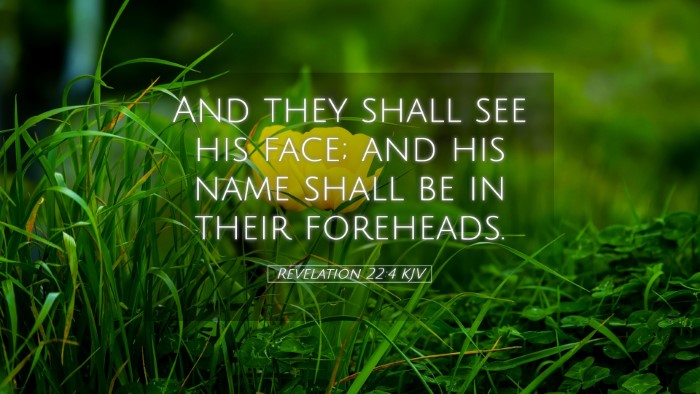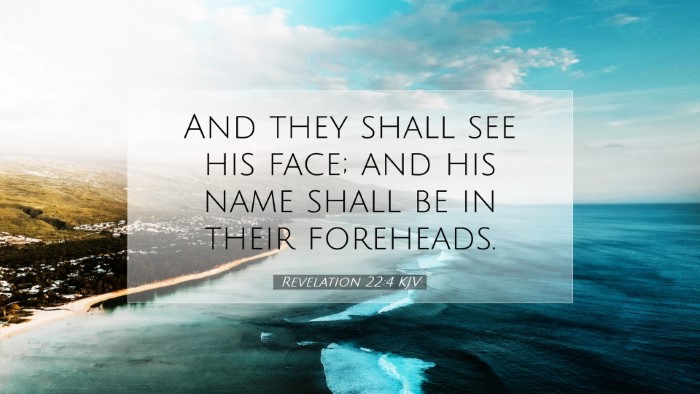Commentary on Revelation 22:4
Verse: "They shall see His face; and His name shall be in their foreheads."
Introduction
The conclusion of the Book of Revelation presents a glorious vision of eternity, encapsulating the ultimate fulfillment of God's promises to humanity. Revelation 22:4 serves as a significant verse wherein the vision of the believers' future in the New Jerusalem is unveiled. This moment underscores the consummation of the Christian hope—the eternal presence of God and the transformative nature of His fellowship.
Insights from Commentators
Matthew Henry's Commentary
Henry offers a profound reflection on the blessedness of being in the direct presence of God. He emphasizes:
- Face-to-Face Fellowship: The ultimate privilege of being able to see God's face signifies unbroken communion. In the Old Testament, this was often understood as a dangerous encounter (Exodus 33:20). Yet, in the New Jerusalem, this is no longer a threat but a promise of intimacy and relationship.
- The Name in Foreheads: The mention of God's name in the forehead implies ownership and identity. Believers are marked by God's character and purpose, symbolizing a new identity rooted in faith and divine calling.
Albert Barnes' Interpretation
Barnes adds clarity to the significance of seeing God and the implications of His name being in their foreheads:
- Seeing God's Face: Barnes sees this as an expression of eternal happiness and completeness in knowing God. The face represents personal revelation and closeness, distinguishing it from mere servitude and distancing.
- Assurance of Identity: The name written signifies that believers are forever aligned with God's purposes, closely implied to their rewards and responsibilities in the eternal state.
Adam Clarke's Exegesis
Clarke brings additional theological depth to the verse, shedding light on its eschatological implications:
- Nature of Divine Revelation: Clarke emphasizes that the vision of God's face implies an era where divine mysteries are fully revealed. Previously veiled aspects of God's person are now accessible, granting believers profound insights into His nature.
- The Forehead Mark: The eternal mark in the forehead serves as a testament to God's eternal claim over His people. Clarke notes that this is a fulfillment of the prophetic declarations regarding God's people being sealed (Ephesians 1:13).
Theological Reflections
This verse serves as a culmination of the eschatological narrative found throughout Scripture. The promise of seeing God's face is synonymous with the complete restoration of the relationship originally intended for humanity in the Garden of Eden. Here are several theological themes that emerge:
- Restoration of Creation: The ability to see God reflects the restoration of the created order, where sin and separation are defeated. This signifies the reversal of the Fall, culminating in a renewed creation.
- Intimacy with God: The direct vision of God represents an intimacy that believers yearn for but can only partially experience in this life. This draws a vivid contrast between earthly existence and heavenly ultimate reality.
- Believers' Identity: The marking of God’s name signifies a deep, unbreakable bond between God and His followers, asserting that their identity is forever entwined with His eternal truth.
Pastoral Applications
For pastors and church leaders, this verse provides a foundation for discussing themes related to eternal hope and assurance of salvation:
- Encouragement for Congregations: Revelation 22:4 can be a source of immense comfort during times of sorrow or loss, reminding believers of the glorious future that awaits them.
- Identity in Christ: Pastors can teach on the spiritual implications of having God's name upon believers, promoting a sense of belonging and purpose in the church community.
- Closing Vision of Hope: Use this verse as a closing sentiment in teachings on eschatology, emphasizing the believer’s ultimate destination and hope in Christ.
Conclusion
Revelation 22:4 encapsulates a profound promise and vision for all believers. Through insights gleaned from esteemed commentators, this verse not only illustrates the joy of being in God's eternal presence but also underscores the transformation that comes with such divine intimacy. As scholars and believers reflect upon this verse, it beckons a heart of worship and anticipation for the future glory that is assured in Christ.


